

I was mighty amused to get this announcement a few turns later:

"Tipu Sultan (Great Prophet) has been born in Gondar." What's so special about that? Well, Tipu just happens to be the focus of my ongoing Ph.D. dissertation - I never expected to come across his name in Civ4!  I actually just spent several weeks in London this past summer doing nothing but researching the fellow in the British Library. It was quite a shock to see Tipu making an appearance in this game, especially as a Great Prophet (which frankly doesn't make much sense). As far as my actual game is concerned, this picture also gives you an indication of my progress to date on Barb Island (still lagging considerably behind North Island).
I actually just spent several weeks in London this past summer doing nothing but researching the fellow in the British Library. It was quite a shock to see Tipu making an appearance in this game, especially as a Great Prophet (which frankly doesn't make much sense). As far as my actual game is concerned, this picture also gives you an indication of my progress to date on Barb Island (still lagging considerably behind North Island).
I generated a Great Engineer in Lisbon around this time, from running an Engineer specialist I think, and because I had already targeted Democracy tech, I used him to knock out about 2/3 of the cost of the Statue of Liberty. Obviously that wasn't a huge priority, given that I only had six mainland cities, but I figured it was worth it for denial purposes. It finished in 1580AD. (On a side note, the improved Jails and new Security Bureaus seem to make it more necessary than ever to beeline to Democracy tech. I'm not sure if that's really a good thing, or if it removes options...)
Suryavarman was on the warpath again soon, dragging his vassal Hammurabi along with him, but fortunately I was not the target:

I had a pair of rifles in all of my mainland cities, so I wasn't exactly scared of him. Still, peace served my purposes better, allowing all of my trade routes to continue to flow uninterrupted. And if I were going to attack someone else, I would have done so much earlier!
I waited until another Great Merchant popped out of Lisbon so that I could trigger a Golden Age:

I didn't need or want the Golden Age (my third already this game!) so much as I was pulling a triple civics swap, and wanted to avoid the turns of anarchy. (I boxed them on the right side of the picture, giving up Slavery, Bureaucracy, and Hereditary Rule in turn.) While this is a cool new feature in the expansion, the Spiritual trait definitely has lost some of its luster. The Cristo Redentor only makes this problem worse. (That wonder is REALLY broken, by the way, but I'm hearing that it will be toned down in the upcoming patch.)
In the ongoing war to the west, it quickly became clear that Suryavarman had bitten off more than he could chew. Not only did the Khmer fail to make any progress, Justinian quickly began rolling up HIS cities left and right:

Quite clearly, Suryavarman had "chosen unwisely." 
As the game dragged on, I continued to be more and more frustrated by my inability to increase my science spending. I've got courthouses everywhere, a perfectly positioned Forbidden Palace, I'm running all cheap civics - yet I can't managed to get the science rate above 70%?! Huh? What's going on here?
In confusion, I turned to the forums at CivFanatics to try and figure out the problem. Well, it turns out that there were some major changes "under the hood" to the maintenance system that controls the costs in Civ4. Feel free to skip this section if you just want to read the account of what happened in my game, but I want to bring this issue into greater focus for those who aren't aware of it (which seems to be almost everyone in the Civ community). In short, the inflation model that Civ4 uses has been tinkered with; inflation expenses in Beyond the Sword rise at a drastically higher rate than in the non-expansion original version. And it gets worse at slower game speeds; Epic is pretty bad, while Marathon is supposed to be horrible. Here's a picture of my Financial Advisor to showcase the problem:

For the moment, let's just concentrate on the inflation numbers in the bottom-right corner. The way inflation works in Civ4 is that all your normal expenses are added up (maintenance + civic costs), then they are multiplied by a percentage to get your inflation costs, which are added on to the total. In non-expansion Civ4, inflation starts at 0% and scales up (after an initial 100-turn grace period) in linear fashion until it reaches 100% on the final turn of the game, in 2050AD. Halfway through the game (as I am when taking this picture) my inflation percentage would be around 40%, a significant difference (40% of 224g is only 90g, a difference of 73 gold/turn).
But in Beyond the Sword, inflation works on a QUADRATIC model, not a linear one. It starts out at the same rate, but continues to increase faster and faster as the game progresses. That's why I'm already paying far more than I would be in non-expansion Civ4, and it will get WORSE before the game ends. Here on Epic speed, a game that lasts until 2050AD will see inflation percentages well over 100%, even up to 160%. And Marathon speed is even worse; some players on CivFanatics have reported inflation getting as high as 250%, which is utter insanity. Clearly someone at Firaxis didn't test out how drastically a quadratic model scales up the inflation rates in the late game.
Wait though, because we're still not done yet. It gets even worse! Note that my "colony expenses" which I griped about before are included in determining that inflation number. Not only do I pay 51 gold/turn for the nonsensical "crime" of founding cities on another landmass, I then pay 73% of that cost again via inflation, for another 37 gold/turn. Just for being on an island, my colonies are costing me EIGHTY-EIGHT gold per turn!  No wonder no one is playing anything but pangaea maps on CivFanatics. The "colonial expenses" are bad, but inflation is magnifying the problem and making it even worse. And just wait until I get some corporations going, which are ALSO factored into inflationary costs. Yowsers. This system is more obtuse and illogical than ever. Shame on whoever went monkeying around with it and messed things up.
No wonder no one is playing anything but pangaea maps on CivFanatics. The "colonial expenses" are bad, but inflation is magnifying the problem and making it even worse. And just wait until I get some corporations going, which are ALSO factored into inflationary costs. Yowsers. This system is more obtuse and illogical than ever. Shame on whoever went monkeying around with it and messed things up.
Just as a final note: what would my equivalent costs be in non-BTS Civ4? Subtract out the colonial expenses and dial down the inflation, and I get (29 + 49 + 95) * (1.4) = 242 gold/turn. As a rough estimate, therefore, I'm guessing that I'm paying out 144 gold/turn more than what I would be in the original game. Sheesh! No wonder I can't get over 70% science!
If this is Firaxis' way of "slowing down" things to add more focus to the late game, it's a bad one. Blah to that. 
I was therefore fully aware of what kind of costs that I would incur from founding a corporation, but this being my first Beyond the Sword game, I just had to try it anyway. I had tons of seafood resources, so Sid's Sushi appeared to be a natural fit for my seafaring civilization. Faro, my Forbidden Palace city, was carefully prepared ahead of time to contain Wall Street. Alright, let's do this and see what happens:

Alright, looking good. Now let's check inside the city:
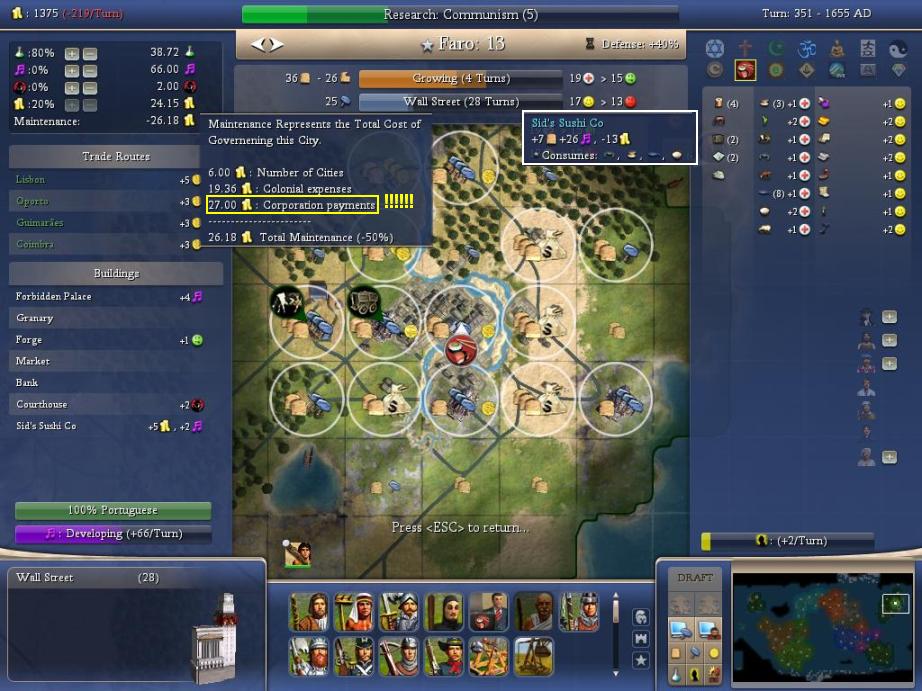



WTF?! I knew it would be bad, but COME ON! 27 gold/turn in corporation payments?! Even with a courthouse here and Wall Street to magnify the corporate income, I still won't make a profit after inflation is factored in. Folks, it looks like the common wisdom is correct on this one. Corporations are dreadfully, horribly broken. You can't ever make a profit off of them; from a financial standpoint, it is NEVER in your interest to spread them to your cities. In fact, the strategy that has emerged is to spread your corporations to the AIs, who will then proceed to destroy their economies by using them. Uhh... that's not good!
This is clearly NOT what Firaxis was intending! 
I have hopes that some of these issues will be resolved in the next patch, but 3.02/3.03 is a total mess as far as corporations are concerned. Anyway, at least my trade routes were bringing in tons of income. Take a look at this picture I snapped:
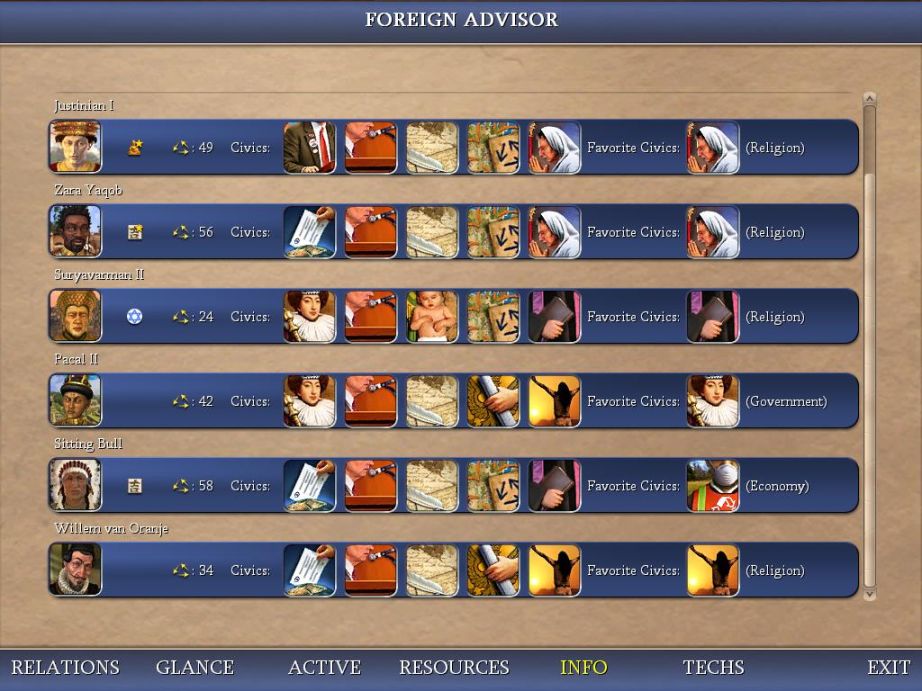
This screen (and the new "Glance" one) are great additions to the Foreign Advisor panel. Here, I'm focusing on the trade route income from the individual civs, shown on the far left side. Trade routes are bringing me 263 commerce/turn - that's equivalent to dozens and dozens of towns! Very nice. Some of the AIs had flirted with Mercantilism previously, but by now I had converted or bribed them all into Free Market or State Property. I had to do everything to keep the routes of commerce open!
By the time that the Khmer/Byzantine war ended, Suryavarman was a shadow of his former self:
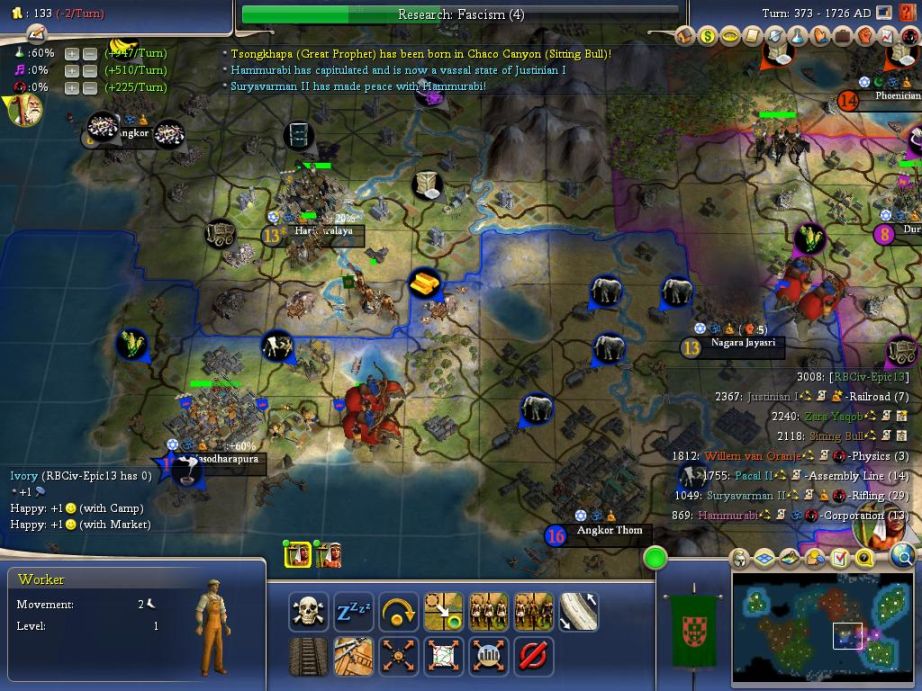
Hammer became a Byzantine vassal (no freedom for the weak, it seems) and the Khmer soon followed suit, left with just two cities. It was nice for me to have two cowed and weak civs on my sole land border, although I admit that Justinian's growing military strength was beginning to become an object of concern.
I decided after some thought that it would be worth my while to spread Sid's Suishi to my top two production cities, with the extra food allowing for more mining that would speed along either the UN or spaceship production. Here I am adding the corporation to Guimaraes:

I get the "great deal" of paying 97g and losing 18 gold/turn for the opportunity to make 15/turn back via Wall Street. Uhh, thanks, though the extra food here will be a big help. Note that Pacal also founded his own corporation; most of the other leaders had gone to State Property, invalidating my corporations, but I could spread Sid's Sushi to Pacal to make some extra money. Time to test out that side of the gameplay and see how well it was holding up - and especially how the AI handled the extra costs. More on that in a minute.
My tech rate continued to stink bigtime, unable to get beyond alternating between 60% and 70% science due to all my insane costs. Spreading Sid's Sushi around to Pacal's cities only allowed me to keep up with the spiraling inflation expenses, not make actual progress in increasing my tech rate.
Meanwhile, Justinian went on the attack again - against Sitting Bull, on the other side of the world:

Not sure what he was thinking, just glad it wasn't me. I'm pretty sure I could have fought that stack off, but it might have been ugly. Instead, these two civs beat each other's brains out for quite some time. Good news, as far as I was concerned. Relations dropped when I had to refuse their demands to enter the war though, argh.
Apparently Murphy wasn't quite finished messing with my game:
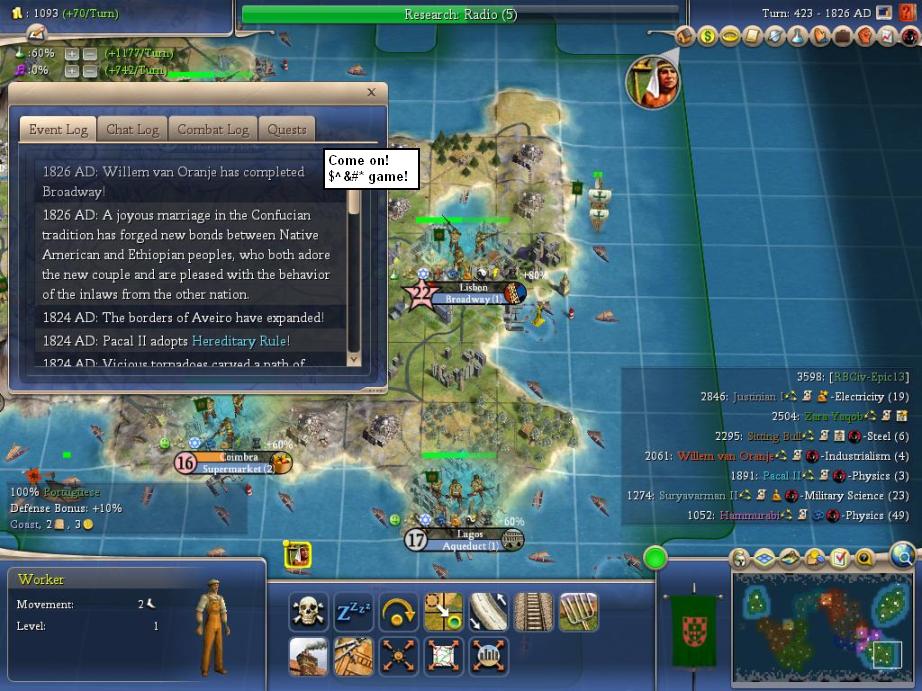
You've got to be kidding me! 
I also got my second "quest" here in the Modern Age, asking me to spread Sid's Sushi to eight additional cities. (The first one had been the Horse Whisperer quest, asking me to build a bunch of stables before entering the Renaissance Age. Well, it popped up about five turns before I discovered Astronomy - so much for that!) I was already spreading the corporation to the AIs anyway, so this was basically free money for me.

10 gold/turn in my Wall Street city equals out to 30 gold/turn in truth. Very nice!
Now Faro was building the Eiffel Tower in the previous picture, which it completed in 1850AD. Since there was nothing else to build of any importance in the city, I decided to have it try out the "wealth" option. To my shock, my income increased by over 100 gold/turn!
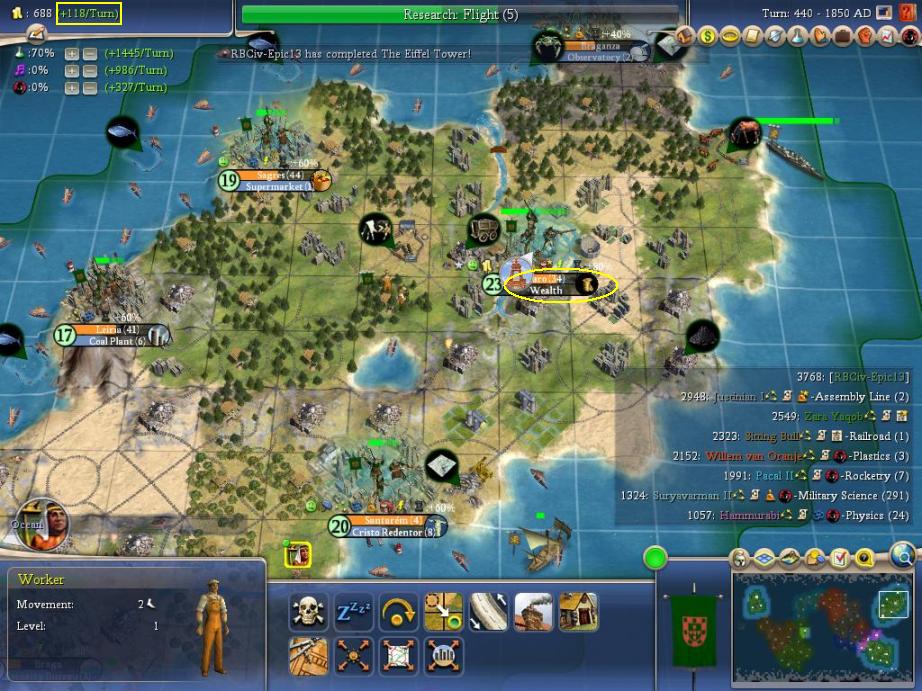
Note the income boxed in green. A single city running wealth increased my income enormously - far more than building courthouses, running cheaper civics, having a well-placed Forbidden Palace, all of that. One city on wealth. It had nothing to do with the fact that Faro had Wall Street either; in Beyond the Sword, all of the production modifiers (forges, factories, power plants) get addded on to the base production when running wealth, culture, or research. In non-expansion Civ4, they do NOT get factored into this calculation, and the shields are in fact HALVED before being converted into gold/culture/research. Here's a picture from my Epic Eleven game demonstrating this:

Washington is producing 4 shields/turn; it has the factory/forge/power plant combo, so in Beyond the Sword this city would get +100% added on to that, for 8 culture/turn. In the game above, of course, those modifiers were not added, and the value was in fact halved (for only 2 culture/turn), as mentioned above. Perhaps this seems like a minor difference, but it's not - it's literally the difference between getting 20 gold/turn and 100 gold/turn when running wealth in cities. In the late game, "Wealth" is now FOUR TIMES more valuable than it used to be! And raw production is the ONLY thing that matters in the gold produced by wealth - you don't even need markets or banks, as they have no effect on this number. So finally, FINALLY I found a way to get my costs under control, but in a horribly broken fashion. Just build factories + power plants in each city, then have them run wealth. Voila, you'll instantly have all the gold you ever need. No real planning or thought required. As long as you have enough military to deter attack, you're set.
This is... worse than I ever imagined it would be.  I can't even begin to tell you how disappointed I am that having all your cities run "Wealth" in the late game is the 100%, guaranteed, One Right Choice (TM) on how to pursue a late-game spaceship victory. I mean, this element existed in Civ4 prior to Beyond the Sword too, but the new inflation model makes it all much worse, because you CANNOT control your costs in the traditional ways through courthouses, cheaper civics, etc. That's right, I pretty much view the WHOLE damned economic model of this game as broken after about the halfway point of the tech tree. I hope that the upcoming patch improves things, but no one's even talking about how badly overpowered the new "wealth" system is, and that's almost as bad of a culprit as inflation. There are some really cool things in Beyond the Sword, but some of this stuff...
I can't even begin to tell you how disappointed I am that having all your cities run "Wealth" in the late game is the 100%, guaranteed, One Right Choice (TM) on how to pursue a late-game spaceship victory. I mean, this element existed in Civ4 prior to Beyond the Sword too, but the new inflation model makes it all much worse, because you CANNOT control your costs in the traditional ways through courthouses, cheaper civics, etc. That's right, I pretty much view the WHOLE damned economic model of this game as broken after about the halfway point of the tech tree. I hope that the upcoming patch improves things, but no one's even talking about how badly overpowered the new "wealth" system is, and that's almost as bad of a culprit as inflation. There are some really cool things in Beyond the Sword, but some of this stuff...
And Murphy had to strike once more, just to set the mood:

I had to add some clip art to the last picture, although at this point it was actually getting pretty funny, in a masochistic kind of way. I sincerely hope I never have another game quite like this! 



